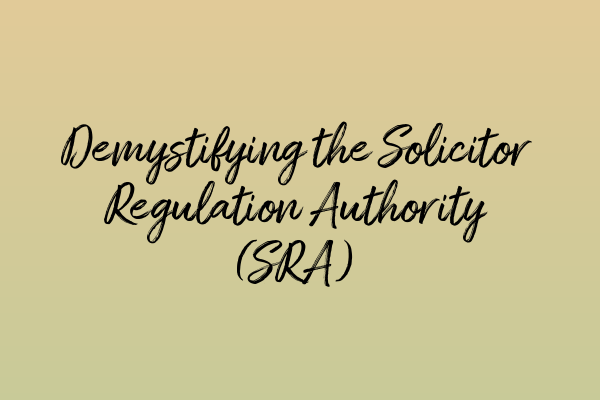Demystifying the Solicitor Regulation Authority (SRA)
As a solicitor, it is crucial to understand the role and regulations of the Solicitors Regulation Authority (SRA), the governing body that ensures legal professionals uphold the highest standards of ethics and professionalism. In this comprehensive guide, we will demystify the SRA and provide an insight into its functions, responsibilities, and impact on the legal profession.
What is the SRA?
The Solicitors Regulation Authority (SRA) is an independent regulatory body responsible for overseeing solicitors in England and Wales. Its primary objective is to protect the public by maintaining the rule of law and promoting the integrity of the legal profession.
Under the Legal Services Act 2007, the SRA was created to replace the Law Society’s regulatory functions. By exercising its regulatory powers, the SRA ensures that solicitors meet the required professional standards, adhere to the principles of ethical conduct, and provide competent legal services to their clients.
Key Functions of the SRA
The SRA carries out several vital functions to regulate and supervise solicitors. Understanding these functions is essential for both legal professionals and those seeking legal advice or representation. Let’s explore some of the key areas of the SRA’s responsibilities.
Setting and Upholding Professional Standards
The SRA sets the Solicitors’ Code of Conduct, which outlines the ethical principles and standards that solicitors must adhere to in their professional practice. This code covers various aspects, including maintaining client confidentiality, avoiding conflicts of interest, and acting in the best interests of the client.
By upholding these standards, the SRA ensures that solicitors maintain professionalism and integrity, which is crucial for building public trust and confidence in the legal profession.
Issuing Practising Certificates
Practising certificates are essential for solicitors, as they enable them to practice law in England and Wales. The SRA issues these certificates annually to solicitors who meet the required criteria, including fulfilling continuing professional development (CPD) obligations and maintaining professional indemnity insurance.
By issuing practising certificates, the SRA ensures that solicitors possess the necessary qualifications and skills to offer legal services to their clients.
Investigating Complaints and Misconduct
In its capacity as a regulatory body, the SRA investigates complaints against solicitors and takes appropriate action in cases of misconduct or professional negligence. It is responsible for enforcing disciplinary proceedings, which may result in sanctions such as fines, suspension, or even striking off the solicitor from the roll.
The SRA’s disciplinary process serves to protect the interests of clients and maintain the reputation of the legal profession.
Why is the SRA important for solicitors and clients?
The SRA plays a crucial role in maintaining the standards and reputation of solicitors and the legal profession as a whole. It protects clients by ensuring that solicitors operate ethically, maintain professional competence, and provide quality legal services.
For solicitors, the SRA provides a framework for professional development, guidance on ethical decision-making, and a robust system for handling complaints and disciplinary actions. By complying with SRA regulations, solicitors can build a strong professional foundation and gain the trust of their clients.
How can the SRA benefit the public?
The SRA’s regulatory oversight benefits the public in several ways:
- Professionalism: The SRA’s standards and regulations ensure that solicitors provide reliable and professional legal advice, safeguarding the interests of their clients.
- Confidence: By rigorously monitoring solicitors and enforcing disciplinary proceedings, the SRA instills confidence in the public, assuring them that legal professionals are held accountable for their actions.
- Protection: The SRA investigates complaints and takes disciplinary action against solicitors who engage in misconduct, protecting the public from unscrupulous or incompetent legal practitioners.
Conclusion
The Solicitors Regulation Authority (SRA) plays a vital role in upholding professional standards, protecting the public, and maintaining the integrity of the legal profession. By setting guidelines, issuing practising certificates, and investigating complaints, the SRA ensures that solicitors operate ethically and provide high-quality legal services to their clients.
Understanding the functions and responsibilities of the SRA is essential for solicitors and clients alike. It fosters professionalism, builds trust, and promotes a legal system that works in the best interests of everyone involved.
If you have any questions or require legal assistance, please feel free to contact us. We are here to help.


Leave a Reply